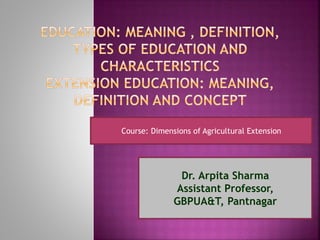
Dimensions of Agricultural Extension Education
- 1. Dr. Arpita Sharma Assistant Professor, GBPUA&T, Pantnagar Course: Dimensions of Agricultural Extension
- 2. The word “educate” comes from the Latin ‘educere’, meaning “to lead out”, “to bring out”. To educate means to bring out of the child, the student, that sprit of learning and wonder, the desire to know, that thirsts for knowledge.
- 3. True education is the harmonious development of the Physical, Mental, Moral and Social, the four dimensions of life. The illiterate of 21st century will not be those who cannot read and write, but those who cannot learn, unlearn and relearn.
- 4. Webster defines education as the process of teaching to develop the knowledge, skill, or character of the student. Education is the process of bringing desirable change into the behavior of human beings. It can also be defined as the process of imparting or acquiring knowledge and habits through instruction or study. Sociologist Rodney Stark declares that, “Education is the cheapest, most rapid, and most reliable path to economic advancement under present conditions.”
- 5. A) Formal education. B) Non-formal education. C) Informal education.
- 6. Formal education is basically an Institutional activity, Uniform and subject oriented, Full time, Sequential, Hierarchically structured, Leading to certificates degrees and diplomas.
- 7. Full time education. Technical and professional training. A variety of specialized programmes. Running from primary school through the university. Chronologically graded education system.
- 8. Any organized education activity Outside the established formal system whether operation Separately or As an important feature of some broader activity that is intended to serve Identifiable learning clienteles and learning objectives.
- 9. 1. It is flexible. 2. It is life, environment and learner oriented. 3. It is diversified in content and method. 4. It is non-authoritarian. 5. It is built on learner-participation. 6. It enhances human and environmental potential.
- 10. The truly lifelong process whereby every individual acquires attitude, values, skills and knowledge from daily experience and the educative inferences and resources in his or her environment from family and neighbors, form work and play, from the market place, the library and the mass media.
- 11. 1. Informal education is the least controlled, that’s why this type of education can not be excluded of somebody’s life. 2. Informal education consists of accidental, unclear, quantitative information. 4. Informal education refers even to emotions, feelings, beliefs etc. 5.Informal education offers responsiveness ready response when interact with environment. 6. Informal education offers possibility to freely act in unknown situation. 7. Informal education offers freedom of self-formation.
- 12. Formal Education Non Formal Education Target Group Mainly young, Universal, Compulsory, Selective Mainly adults, those interested, voluntary and open Time Scale Full time and Primary activity Part time and Secondary activity of participants Relevance Separate form life, In special institution, In sole purpose buildings Integrated with life, In the community, In all kinds of settings Programme Run by professionals, Excludes large parts of life It is participatory, Includes large parts of life. Curriculum One kind of education for all Education to meet learner Methods Teacher centered,Mainly written Learner centered, Much is Oral Objectives Conformist Promotes
- 13. Formal Education Non Formal Education Independence Set by teachers, Competitive Set by learners and Controlled by Learners Orientation Future Present Relationship Hierarchical Egalitarian believing in Equal Right Validation Validated by education Professional Continuing validated by learners
- 14. Latin roots “ex”-out “tensio”- Stretching Extension is that type of education which is stretched out to people in the rural areas far and near, beyond the limits of the educational institutions to which the formal type of education is usually confined.
- 15. “Extension” originated in England in 1866 with a system of University Extension which was taken up first by Cambridge and Oxford Universities. 1873- The term “Extension Education” was used by Cambridge University.
- 16. Extension education is education for the betterment of people and for changing their behavior i.e. knowledge, skill and attitude. Extension education is the dissemination of useful research findings and ideas among rural people to bring out desirable changes in their social and cultural behavior. Extension education is an applied science consisting of contents derived from researches, accumulated field experiences and relevant principles drawn form the behavioral sciences synthesized with useful technology, in a body of philosophy, principles, contents, and methods focused on the problems of out of school education for adults and youths. (Lagans. J.P.)
- 17. The expression of the ends forwards which our efforts are directed. Direction of movement before, starting any programme. The objectives should be such which provide right direction to the large number of people to set a direction and travel the distance between theory and practice.
- 18. To raise the standard of living of the rural people. Extension education in our country is primarily concerned with the following main objectives: The basic objectives of the extension education are the overall development of the rural people. To bring about desirable changes in the human behavior, which includes change in knowledge, skill and attitude.
- 19. The dissemination of useful and practical information relating to agriculture, including improved seeds, fertilizers, implements, pesticides, improved cultural practices, dairying, poultry nutrition etc. 4. To make the people aware that agriculture is a profit table profession. 5. To create an environment for rural people so that they can show their talent, leadership and efficiency. 6. To provide appropriate solution of the farmer’s problems. 7. To bring the scientist closer to the farmers.
- 20. Thanks
